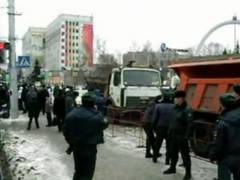Russian Urban Centers Might Be Target for Next Muslim Riots
Publication: Eurasia Daily Monitor Volume: 10 Issue: 44
March 8, 2013 02:21 PM

Police in Novokuznetsk prevent Russian nationalist clashes with Muslims, March 5 (Source: islamnews.ru)
On March 2, Federal Security Service (FSB) personnel in St. Petersburg arrested members of the Nurjular organization, which in 2008 was designated as an extremist group by the Russian Supreme Court and outlawed (http://ru.apa.az/news/242585). Five citizens of Russia, four citizens of Azerbaijan and one citizen of Turkmenistan were arrested in the special operation in the St. Petersburg region. According to government officials, Nurjular was financially supporting Chechen militants and maintained close connections to radical Islamists in Turkey (www.ntv.ru/novosti/500596/). This wording indicates that the government agencies behind the arrests did not bother to provide a plausible explanation for their actions and simply offered a random pretext. It is hard to imagine anyone from St. Petersburg being able to finance the Chechen rebels. This explanation was apparently meant for the majority of the Russian public that does not regularly follow the situation in the North Caucasus closely.
It is not surprising that nine of the ten accused Islamists detained on March 2 were released the next day without charge and that only one remains in custody (http://www.fontanka.ru/2013/03/04/154/). The nine were released despite the fact they had been declared extremely dangerous Islamists. Russian national media predictably did not cover the release of these people accused of extremism; their release was only covered by the local media outlets in St. Petersburg. So most Russians will continue to see the arrest of suspected Islamists as a successful operation of the Russian security services in St. Petersburg and will be unaware that the operation actually netted nearly no results.
In fact, the operation involving the "neutralization” of members of Nurjular raises a number of questions. The Russian government banned the activities of this organization after a philologist provided linguistic expertise showing the group was extremist in character (www.portal-credo.ru/site/print.php?act=news&id=54256). Even Russia’s human rights ombudsman, Vladimir Lukin, defended this organization, whose activities were based on the works of Said Nursi, a prominent Turkish Islamic author of Kurdish origin. Lukin drew the court’s attention to the fact that Nursi’s books were widely respected in the Muslim world and that outlawing them would negatively impact Russia’s image among Muslims worldwide (http://i-r-p.ru/page/stream-document/index-13204.html). Despite these objections, Nursi’s works were officially designated as extremist and banned in Russia. So when the police now arrest Islamists, they tend to find Nursi’s books at the site of the arrest because prior to the ban these works were published in nearly all of Russia’s regions, including Moscow, St. Petersburg, Kazan, Makhachkala and Nalchik. So chances are always high that people who participate in any Muslim organizations will have Nursi’s books at hand.
A joint operation in St. Petersburg by police and FSB personnel three weeks before the latest arrests also yielded nearly zero results. In February, government agents arrested about 300 Muslims in the prayer rooms of the Apraksin Dvor trade center. Officials claimed that those arrested were radical Islamists (http://lentachel.ru/articles/20977). The arrested Muslims, who were herded onto police buses, reportedly threatened the police that they would complain to Ramzan Kadyrov. This by itself is an interesting reaction, as it appears that Kadyrov is already seen as someone who can speak for Russia’s Muslims. In November 2012, members of the Party of Islamic Liberation (a.k.a. Hizb ut-Tahrir) were arrested in Moscow (http://www.radiovesti.ru/articles/2012-11-12/fm/72844), but those arrests also had no significant results.
The reason for the latest arrests of Muslims in St. Petersburg may have been as mundane as complaints by their Russian neighbors to police about the prayers being recited in the prayer rooms (www.baltinfo.ru/2013/03/04/Zaderzhannye-v-Peterburge-po-obvineniyu-v-ekstremizme-otpuscheny-na-svobodu-340048). This is not all that surprising, but it could eventually lead to a violent Muslim backlash. Localities across Russia are using the fact that ethnic Russians comprise the majority in the country to prohibit Muslim communities from constructing mosques. The authorities usually delegate decisions on the issue of mosque construction to the citizens in order to avoid being accused of siding with the Muslims. The citizens then decide that they do not want a mosque in their neighborhood. For Russian residents, having a mosque in the central part of a Russian city necessarily means having to hear the Muslim call to prayer five times a day. The city of Moscow has consistently refused to build mosques for years. When local authorities designate an area for mosque construction (http://top.rbc.ru/society/17/12/2012/836832.shtml), several hundred people invariably stage a protest and the authorities—under the pretext of negative public opinion—forbid the construction of the mosque (www.kp.ru/online/news/1379005/). The first site of religious clashes could be Novokuznetsk where, on March 5, police dispersed Russian nationalists protesting the construction of a mosque in the city (http://www.islamnews.ru/news-138657.html). Russian nationalists and Muslims in that city are at loggerheads, and the conditions for an uprising sparked by a religious conflict are ripe.
The muftis insist that at least three or four new mosques be built in Moscow (www.islamnews.ru/news-137683.html), which would relieve the city’s central mosques of their excessive loads of parishioners. Today these mosques are overcrowded and cannot accommodate many of the Muslims. There are currently a total of five full-fledged mosques in Moscow (www.centrasia.ru/newsA.php?st=1236813060). However, Moscow Mayor Sergei Sobyanin fears that more mosques there will attract more Muslims and migrants to the city (www.kp.ru/online/news/1379005/). Even if the figure of two million Muslims in Moscow is exaggerated (http://sunna-press.com/news/snq/1004-v-moskve-uvelichilos-kolichestvo-musulman.html), official sources already put the number of Muslims in Moscow at over half a million.
Thus, despite the growth of the Islamic segment of Russian society, Moscow retains a policy of suspicion and keeping Muslims at a distance from important decision-making in the government. This attitude produces distrust that could break out into outright confrontation at some future point. The Muslim part of Russia’s population will not tolerate being treated as second-class citizens and will demand their rights in society and in the governing of the country.
http://www.jamestown.org/programs/nca/single/?tx_ttnews%5Btt_news%5D=40577&tx_ttnews%5BbackPid%5D=24&cHash=9b53a4aca079d8ce262cf19f916a3c93






















